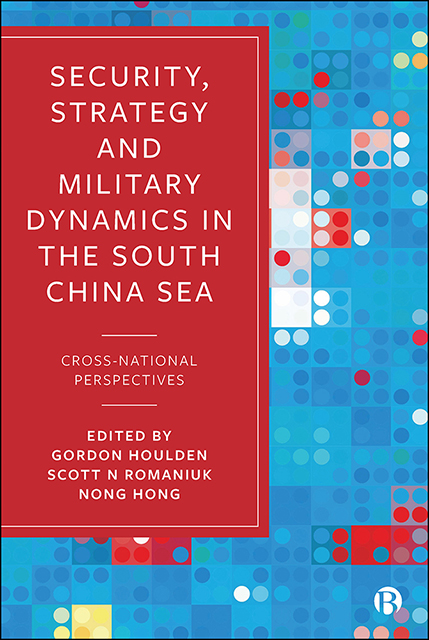Book contents
- Frontmatter
- Contents
- List of Tables
- Notes on Contributors
- Foreword
- Introduction: Strategic Challenges and Escalating Power Rivalry in the South China Sea
- 1 Between Competition and War: Complex Security Overlay and the South China Sea
- 2 The South China Sea as an Echo Chamber of Chinese Foreign and Security Policy
- Part I Claimants of the Contested South China Sea
- Part II Non-Claimants in Southeast Asia
- Part III Quadrilateral Security Dialogue States
- Part IV Non-Claimants in Europe and Eurasia
- Conclusion: Looking over the Horizon – Prospects for Settlement of the South China Sea Dispute?
- Index
4 - Taiwan’s South China Sea Policy under the Tsai Administration
Published online by Cambridge University Press: 13 April 2023
- Frontmatter
- Contents
- List of Tables
- Notes on Contributors
- Foreword
- Introduction: Strategic Challenges and Escalating Power Rivalry in the South China Sea
- 1 Between Competition and War: Complex Security Overlay and the South China Sea
- 2 The South China Sea as an Echo Chamber of Chinese Foreign and Security Policy
- Part I Claimants of the Contested South China Sea
- Part II Non-Claimants in Southeast Asia
- Part III Quadrilateral Security Dialogue States
- Part IV Non-Claimants in Europe and Eurasia
- Conclusion: Looking over the Horizon – Prospects for Settlement of the South China Sea Dispute?
- Index
Summary
Introduction
In January 2016, Tsai Ing-wen, the candidate for the Democratic Progress Party (DPP), won in Taiwan's presidential election and was inaugurated as the 14th-term president of the Republic of China (“ROC”) in May of the same year. The new Tsai government adopted a foreign policy position of “cutting off Mainland China, following the United States [US] and Japan, and catering to ASEAN,” which affects the planning and development of Taiwan's South China Sea (SCS) policy under the Tsai administration. In July 2016, Taiwan announced that the award rendered by the Tribunal that heard the Philippines v. China SCS arbitration case is completely unacceptable because, inter alia, in the award, the ROC is referred to as the “Taiwan Authority of China.”
On July 19, 2016, President Tsai put forth four principles and five actions pertaining to the SCS issues. One of the policy principles is concerned about the obligation to uphold the freedom of navigation and overflight in the SCS region, which is also one of the main policy concerns of the US government. In January 2019, asked by The Sunday Telegraph if she would support a British presence in the SCS, President Tsai signalled that Taiwan would welcome: “any actions that will be helpful towards maintaining peace in the SCS, as well as maintaining freedom of passage.” The Tsai government is also taking actions to promote closer Taiwan–Japan security cooperation in line with the development of the US Indo-Pacific strategy. In March 2017, it was reported that Taiwan's Ministry of Defence was taking a very low-profile attitude in response to Japan's sending warships to the SCS.
Currently, Taiwan's main SCS policy actions focus on the promotion of scientific collaboration and developing Taiping Island as a centre of humanitarian assistance and rescue as well as a base for logistic supply. In June 2019, an international conference on the Pratas Islands was organized by the newly established Ocean Affairs Council (OAC). International scholars were invited to visit the Pratas Islands and make presentations on a variety of issues regarding ocean law, policy, and security. However, it should be noted that President Tsai herself, as the head of the National Security Council (NSC), together with senior national security advisors of the Council, is in charge of the government's SCS policy making, not the OAC.
- Type
- Chapter
- Information
- Security, Strategy, and Military Dynamics in the South China SeaCross-National Perspectives, pp. 79 - 100Publisher: Bristol University PressPrint publication year: 2021



